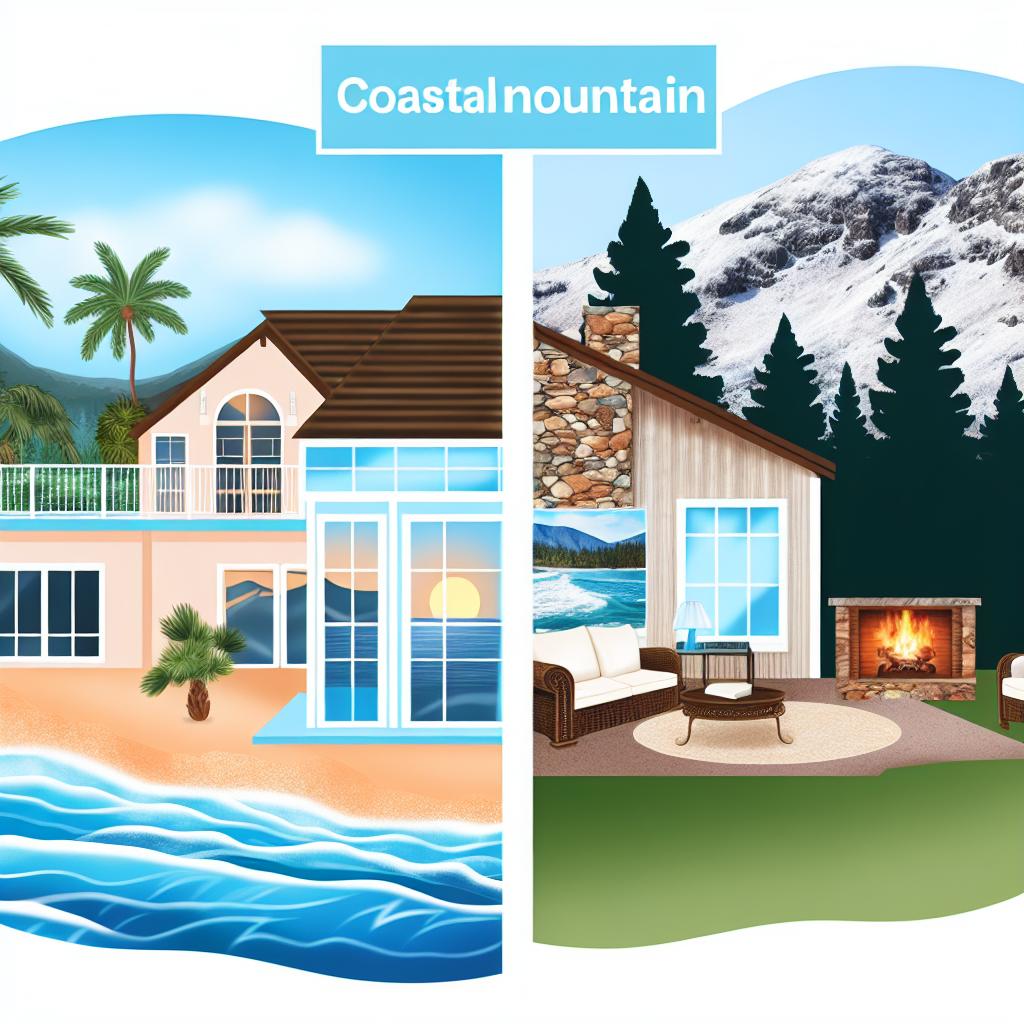How to decide between coastal or mountain properties

Introduction
Choosing between a coastal or mountain property is a significant decision that involves considering various factors, each of which carries its own set of implications for potential buyers. Both coastal and mountain locations provide unique benefits and challenges, shaped by geographical considerations, economic factors, and personal preferences. This article aims to explore the primary considerations to assist prospective buyers in making informed decisions about owning a property in these distinct locales.
Location and Accessibility
The location and accessibility of a property can greatly influence the buying decision.
Coastal Properties: Coastal properties are typically situated near beaches or oceans, offering breathtaking scenic views of the vast ocean and opportunities for recreational activities such as swimming, sailing, and sunbathing. The degree of accessibility to these coastal regions can vary significantly. Some coastal properties are located near urban centers, benefitting from developed transport links and infrastructure, making travel and logistics relatively convenient. Conversely, others might be more secluded, offering privacy but potentially increasing travel time and reducing convenience.
Mountain Properties: On the other hand, mountain properties are nestled in elevated terrains, providing magnificent landscapes and a tranquil environment conducive to peace and relaxation. However, the accessibility to these remote mountain locations might be more challenging due to the terrain. Reaching such properties may require all-wheel-drive vehicles or specialized infrastructure, potentially increasing travel complexities, especially during adverse weather conditions.
Climate and Weather
Climate and weather patterns are critical elements to consider when choosing between coastal versus mountain properties.
Coastal Properties: Coastal regions generally enjoy milder climates compared to mountainous areas. They provide a moderate climate that can be appealing for those looking for year-round living. However, these regions can also face risks, such as hurricanes or intense rain seasons, necessitating preparations for such potential weather-related challenges.
Mountain Properties: Mountain regions often experience more pronounced seasonal variations, with cooler summers and considerably colder winters compared to coastal areas. Prospective buyers should carefully assess their comfort levels with such temperature extremes and prepare for heavy snowfall, which could lead to access issues during winter months.
Cost Considerations
Understanding the cost dynamics is vital, as property pricing varies considerably between coastal and mountain areas, influenced by factors such as demand, local amenities, and proximity to urban centers.
Coastal Properties: Coastal properties tend to be more expensive due to high demand for scenic waterfront locations. In addition to higher purchase prices, insurance premiums can also be elevated, primarily due to risks associated with flooding or storm damage.
Mountain Properties: Generally, mountain properties might be more affordable upfront, but potential hidden costs should be taken into account. These may include ensuring accessibility during winter months or the maintenance of properties in rugged terrains, which could add to ongoing expenses.
Investment Potential
Investment potential is another critical area where coastal and mountain properties differ, heavily dependent on current market trends and buyer expectations.
Coastal Properties: Historically, coastal properties can appreciate rapidly in value due to their high demand. However, it’s important to note that market fluctuations and environmental factors, such as coastal erosion or climate change impacts, might affect long-term value.
Mountain Properties: Mountain properties often present unique investment opportunities, particularly in the realm of vacation rentals. Popular skiing or hiking destinations can drive demand for rental income, especially during peak tourist seasons, making them potentially lucrative investments.
Lifestyle and Community
The lifestyle offered by both coastal and mountain properties varies significantly, catering to different preferences and community engagements.
Coastal Properties: These are suited for individuals seeking an active lifestyle with ample opportunities for water sports and participation in community events typically associated with vibrant beach living. Residents often enjoy a bustling social life with diverse activities.
Mountain Properties: Mountain living appeals to those valuing tranquility and engaging in outdoor activities such as hiking, skiing, and exploring nature. Communities in mountain areas are often smaller and more tight-knit, which can be appealing for those seeking a subdued, idyllic lifestyle.
Environmental Impact and Sustainability
Sustainability and environmental impact play a crucial role in property decision-making, with both coastal and mountain environments requiring careful consideration in these areas.
Coastal Properties: Properties proximate to the ocean necessitate mindful development practices to prevent erosion and protect marine ecosystems. Buyers should consider sustainable building practices and be involved in local conservation efforts to preserve these delicate environments.
Mountain Properties: Issues such as deforestation and water management are central concerns in mountainous regions. Prospective buyers should remain aware of their environmental footprint, opting for sustainable practices and supporting local initiatives aimed at preserving natural habitats and biodiversity.
Conclusion
The decision between coastal and mountain properties involves a comprehensive evaluation of numerous factors, including accessibility, climate, cost, investment potential, lifestyle preferences, and environmental impact. Prospective buyers are advised to conduct detailed research and, where possible, consult with local experts in the area of interest. This strategic approach will ensure that the final decision aligns well with both practical needs and personal desires, leading to a gratifying property ownership experience.
